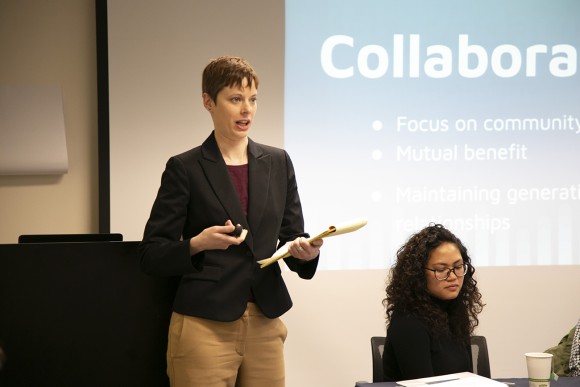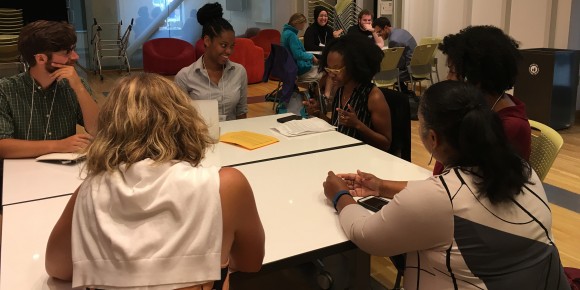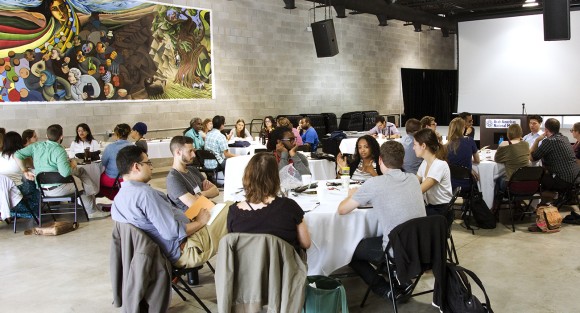The Rackham Program in Public Scholarship supports publicly engaged research, teaching, and programming in the University of Michigan Rackham Graduate School. Working with graduate students in all fields, the program offers a range of professional development resources, including a summer institute on public scholarship, a yearlong series of workshops on engaged teaching, and financial support in the form of grants and fellowships.

These offerings are complementary and share a core commitment to creating scholarship with community partners that benefits all involved, Program Manager Joseph Cialdella explains. “Whether that’s an exhibit for one of our fellows at the Wright Museum or a course that might benefit a community partner in addition to undergraduate students, it is all connected by a sense of wanting students to see their education as serving a broader public good since we are a public university.”
The Institute for Social Change and the Engaged Pedagogy Initiative
The Institute for Social Change is a four-day intensive summer program for 25 graduate students from across the university, in which they come together to explore publicly engaged scholarship. The program features site visits and workshops with diverse stakeholders, including faculty and community members. Participants build capacity to create engaged scholarship, working together in teams to address a community partner’s need rather than developing individual projects.
“The Institute is meant to be an introduction to doing publicly engaged scholarship. We focus a lot on process and how you work together collaboratively with a team that might be interdisciplinary, both within the humanities and in this case with students outside the humanities,” Cialdella explains. “This year they all worked on the same dilemma, which is a cooperative space called Cass Corridor Commons in Detroit that houses several social justice-focused nonprofits. They have been grappling with their vision for the space within the neighborhood and within the larger city of Detroit.”


Students met with the partner on the first day of the program. In five teams over the course of the week, they worked around this central dilemma. On the last day of the Institute, each team presented different suggestions for how their own disciplines might offer productive ways forward. For example, one team presented oral history as a tool to start conversations within this community of organizations about their future.
The Engaged Pedagogy Initiative is a yearlong program of seminars for ten graduate students exploring the theory and practice of community-based learning. Participants meet twice a month for seminars, leading to the production of syllabi for engaged courses.
Public Scholarship Grants and Public Engagement Fellowships
The Rackham Program in Public Scholarship offers two kinds of financial support: Public Scholarship Grants and Public Engagement Fellowships. Both provide opportunities for graduate students to advance scholarship and public interests together with non-academic partners.
Public Scholarship Grants offer up to $8,000 to fund mutually beneficial and collaboratively designed research projects between graduate students and non-academic partner organizations, which have in the past included K-12 schools, government agencies, and cultural and community organizations.
Public Engagement Fellowships support graduate student internships with cultural, nonprofit, and educational organizations on and off campus, offering the opportunity to develop mutually beneficial projects and to explore career directions that utilize their academic training.
Jana Wilbricht’s “Words Flying Through the Air”
The Rackham Program in Public Scholarship has supported many projects since its inception in 2008, many of which are included in the Humanities for All database.
In 2016, funding from the Program for Public Scholarship enabled Jana Wilbricht to undertake a research project in partnership with two tribal radio stations: KUYI Hopi Radio in Arizona and KYUK in Alaska. The project formed a part of Wilbricht’s dissertation research in the Department of Communication Studies.
“[It] explores and supports the role of tribal radio in providing access to accurate, culturally relevant health information for residents of rural American Indian reservations in the U.S.,” Wilbricht explains in her report. “American Indians and Alaska Natives are disproportionately affected by digital divides and health inequities, and the local, tribally owned and operated radio stations are a key health information resource in many tribal communities.”
“Through interviews with station leaders, content analyses of health-related content, and focus groups with listeners, I aim to understand how tribal radio contributes to improved health awareness and outcomes in this population,” Wilbricht continues. “Through a set of direct community outcomes, the project directly contributes to the missions of the partnering radio stations.”
The funding from the Rackham Program made a big impact, Wilbricht explains. “I would not have been able to do community-based, truly participatory research for my dissertation with these communities.” Funding supported travel and fair payment to the stations for use of their space and their time, Wilbricht continues. “As a graduate student I would not have had access to that kind of funding, that kind of support, without a program that specifically funds this sort of research."